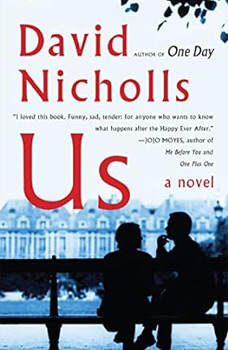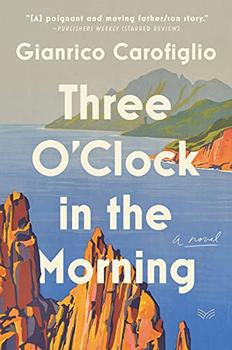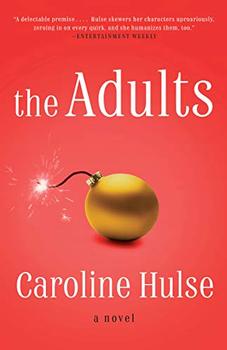Summary | Excerpt | Reviews | Beyond the book | Read-Alikes | Genres & Themes | Author Bio

A Novel
by David NichollsAfter nearly thirty years of marriage, the middle-aged biochemist who narrates Us has learned a few things from his artist wife. One is that you should always carry a novel when you go on a journey. "In the early days of our relationship," he recalls, "I neglected to take a book on to the plane. It was not a mistake I would make again." His wife is startled by the lapse. "I've always wondered who those freaks are who don't read novels." He imagines a slip in her affections, as if she is asking herself whether she can "really love a man who doesn't see the point of made-up stories." She begins to provide him novels, stories that "will have won some award but won't be too complicated," and he reads them out of love.
Us is that kind of book, a pleasurable read with short, comic chapters that also treads on satisfying emotional territory. Douglas Petersen, the biochemist, is laying out the story of his marriage and family at a crisis point. Just as his only son, Albie, is poised to leave the nest (for art school), his wife, Connie, has come to the realization that the "marriage has run its course." Douglas embarks on an exercise in reckoning, going back over the history of his life with Connie. At the same time, the family takes a literal journey, a Grand Tour of Europe (see 'Beyond the Book') meant to be a going-away present for Albie. It's easy to imagine the story unspooling from other points of view – Albie, the young artist, grows up as he pulls away from his parents. Or Connie, the artist whose ambitions have been frustrated by conventional marriage and motherhood, sees the chance of a renaissance. But here, the focus is on Douglas, the paterfamilias, and his self-reflection is less a mid-life crisis than a mid-life coming of age.
Nothing goes as Douglas has laid out in this precisely calibrated European itinerary. Even the "note to self" he makes while preparing for the Grand Tour ("3. It is not necessary to be seen to be right about everything, even when that is the case.") is quickly overridden by habitual irritations – like the fact that someone has once again failed to refill the rinse-aid in the dishwasher.
As a character, Douglas is thoroughly entertaining – self-effacing and self-aware in equal measure. He claims to have been a stodgy young nerd, before Connie came around ("The only acid in this house, I was fond of saying around the lab, is deoxyribonucleic acid"), but this is a stretch, because his intelligent sense of humor carries the book. The way he tells it, Connie is the catch and he is lucky to have her. But as he comes across in Us, Douglas is the perfect romantic hero, ebullient and loving and full of wry social commentary. He fascinates.
It's almost impossible to read Us without imagining the casting of the movie. Indeed, we are invited to think this way on the third page, when Douglas remembers a dinner party where everyone is guessing "who would play you in the film of your life." Nobody can think of anyone to play Douglas, but I could, and so will you. (Bill Nighy?) I like to read a novel without a lot of preconceptions, so it wasn't until later that I learned David Nicholls was an actor and screenwriter first and a novelist second. He has turned two of his previous novels, One Day and Starter for Ten, into films, and Us is soon to follow. It's possible to be cynical about reading a book that is expected to be a big commercial juggernaut, or a gateway to something bigger and more lucrative (the film) – but seeing Us through that lens would underestimate a book that is, as it should be, more than a pre-screenplay "treatment." There is emotional truth and subtlety here, in Douglas Petersen's view of the world, that will never make it to the big screen.
![]() This review was originally published in The BookBrowse Review in January 2015, and has been updated for the
July 2015 edition.
Click here to go to this issue.
This review was originally published in The BookBrowse Review in January 2015, and has been updated for the
July 2015 edition.
Click here to go to this issue.

If you liked Us, try these:

by Gianrico Carofiglio
Published 2022
A coming-of-age novel—a heady union of Before Sunrise and Beautiful Ruins—about a father and his teenage son who are forced to spend two sleepless nights exploring the city of Marseilles, a journey of unexpected adventure and profound discovery that helps them come to truly know each other.

by Caroline Hulse
Published 2019
A couple (now separated), plus their daughter, plus their new partners, all on an epic Christmas vacation. What could go wrong?
Your guide toexceptional books
BookBrowse seeks out and recommends the best in contemporary fiction and nonfiction—books that not only engage and entertain but also deepen our understanding of ourselves and the world around us.